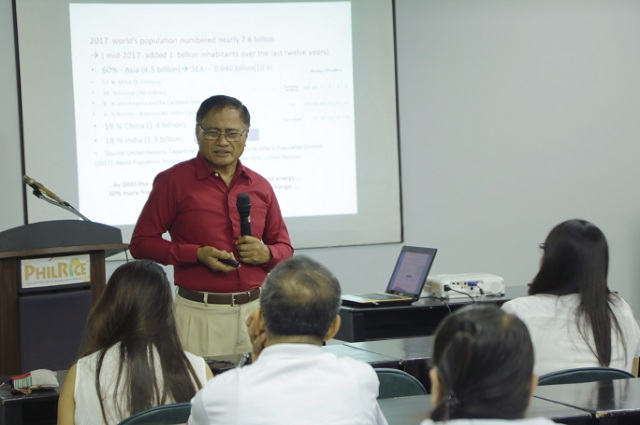A professor has asserted in a seminar that organic agriculture and less meat consumption may reduce greenhouse gas emission (GHG).
Dr. Teodoro C. Mendoza, a professor from the Institute of Crop Science in College of Agriculture, UP Los Baños and a member of the PhilRice Board of Trustee, was the resource person of the first PhilRice Institutional Seminar Series with the topic on “Achievement of Food Security in Relation to GHG Emission” held at PhilRice, Central Experiment Station in Maligaya Science City of Muñoz, Nueva Ecija, January 10, 2018.
Mendoza discussed the current challenges related to food security and GHG emission.
He mentioned overpopulation as one challenge, and in his presentation, he emphasized that “increase in population leads to increase in consumption of energy”. With the increase of population also comes the industrialized food systems and as a result, food production has become a major source of GHG emission. Providing figures on this statement, he said around 44-57% of GHG emissions are agriculture and food-related while only around 18% are from the 850 million vehicles.
This enormous amount of GHG emissions is very relevant to rice farming because they aggravate climate change, which has been affecting the practices of farmers for years now. Having discussed the challenges that triggered the enormous emission of GHG, Mendoza also discussed ways on how to reduce GHG emissions in agriculture.
According to him, one option is shifting to organic agriculture. Using the data he presented, he asserted that organic agriculture has lower energy output compared to conventional farming.
On the consumption side, he also emphasized that reduction of animal-based food products would help decreasing GHG emissions. This is because the processes (like animal feeds production and logistics) done in animal or meat production from farm to consumer’s table emits significant amount of GHG. Less consumption of animal products or meat also means consuming food on the lower portion of the food chain or food like fruits and vegetables. Mendoza called organic agriculture and less meat consumption as twin steps to achieve less energy and GHG emission.
Towards the end of his presentation, Mendoza surfaced other efforts worldwide in terms of fighting the challenges brought by climate change.





